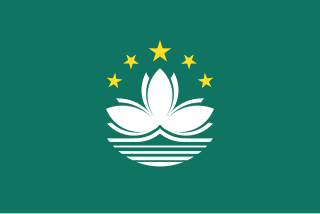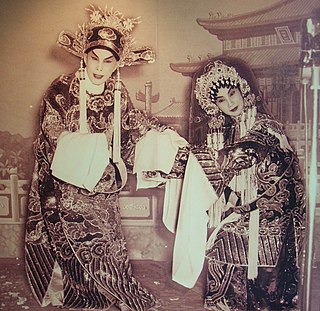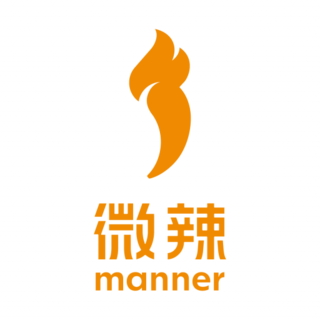
Macau or Macao is a special administrative region of the People's Republic of China. With a population of about 680,000 and a land area of 32.9 km2 (12.7 sq mi), it is the most densely populated region in the world.

Demographic features of the population of Macau include population density, ethnicity, education level, health of the populace, economic status, religious affiliations and other aspects of the population.
The Macanese people are a multiracial East Asian ethnic group that originated in Macau in the 16th century, consisting of people of predominantly mixed Cantonese and Portuguese as well as Malay, Japanese, English, Dutch, Sinhalese, and Indian ancestry.

Cantonese opera is one of the major categories in Chinese opera, originating in southern China's Guangdong Province. It is popular in Guangdong, Guangxi, Hong Kong, Macau and among Chinese communities in Southeast Asia. Like all versions of Chinese opera, it is a traditional Chinese art form, involving music, singing, martial arts, acrobatics, and acting.

Macau is a Special Administrative Region of the People's Republic of China. It was formerly a colony of Portugal, which left a legacy of linguistic and other cultural elements. The music is called Macanese music, a mixture of Cantonese and Portuguese music.

Tourism is a major industry in Macau. It is famous for the blend of Portuguese and Chinese cultures and its gambling industry, which includes Casino Lisboa, Macau, Sands Macau, The Venetian Macao, and Wynn Macau.
Macanese cuisine is mainly influenced by Chinese cuisine, especially Cantonese cuisine and European cuisine, especially Portuguese cuisine and influences from Southeast Asia and the Lusophone world, due to Macau's past as a Portuguese colony and long history of being an international tourist gambling centre.

The egg tart is a kind of custard tart found in Chinese cuisine, derived from the English custard tart and Portuguese pastel de nata. The dish consists of an outer pastry crust filled with egg custard. Egg tarts are often served at dim sum restaurants, Chinese bakeries and cha chaan tengs.
Di Nü Hua is a fictional Chinese story about Princess Changping of the Ming Dynasty and her husband/lover, Zhou Shixian. The first known story was a Kunqu script written in the Qing Dynasty, while the second version was a Cantonese opera from the early 1900s later found in Japan and Shanghai. Little information is available from this early 1900s version. The contemporary prevailing version, not meant to be historically accurate, comes from the second Cantonese opera script.
Cantonese culture, or Lingnan culture, refers to the regional Chinese culture of the region of Lingnan: twin provinces of Guangdong and Guangxi, the names of which mean "eastern expanse" and "western expanse", respectively.

TDM - Teledifusão de Macau, S. A. provides public broadcasting services in Macau. By running five digital terrestrial television channels, one satellite television channel and two radio channels, TDM provides local audiences with a wide range of content in Macau's two official languages, Chinese (Cantonese) and Portuguese, as well as having time-slots for English as well as Indonesian and Tagalog, which reflects the multicultural nature of the city, with 95 percent of the population being Chinese and five percent made up of Portuguese and other ethnic groups.

The handover of Macau from the Portuguese Republic to the People's Republic of China was at midnight on 20 December 1999. This event ended 442 years of Portuguese rule in the former settlement, which began in 1557.

Yam Kim-fai (Chinese: 任劍輝, 4 February 1913, also known as Ren Jianhui was a renowned Cantonese opera actress in China and Hong Kong.
Articles related to Macau include:

Portuguese sauce is a sauce in Macanese cuisine.

The following outline is provided as an overview of and topical guide to Macau:

The Government of the Macau Special Administrative Region allows citizens of specific countries/territories to travel to Macau for tourism or business purposes for periods ranging from 14 to 180 days without having to obtain a visa. For other entry purposes, such as establishing residence on a long-term basis, a different policy applies.
Leon Ko Sai-tseung is a composer for musical theatre and films. He won a Richard Rodgers Development Award, a Golden Horse Award and numerous musical awards. His mother, Lucilla You Min (尤敏), was a famous actress in post-war Hong Kong Mandarin cinema and won "Best Actress" at the 1st Annual Golden Horse Awards and two consecutive Asian Film Festivals. His grandfather, Bak Yuk Tong (白玉堂), was a famous Cantonese opera artist, known as one of the Four Super Stars (四大天王).

Manner Culture Enterprises Limited is a Macau entertainment company. The company produces comedic videos in Cantonese that can be between a few seconds to a few minutes. It has a dozen performing artists under management.

Bo-Ying Lee (Chinese: 李寶瑩 is a former Chinese actress and Cantonese opera singer from Hong Kong. Lee is credited with over 45 films.


















